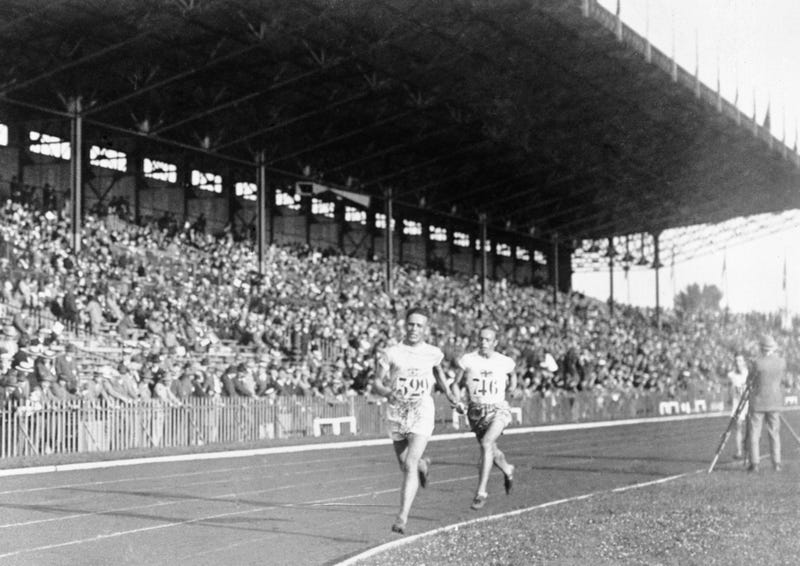
——
Colombes, France, July 8 — The stars and stripes waved triumphantly tonight over the Olympic stadium, the third day of the Olympic games having witnessed a great battle for international athletic supremacy in which the United States put its strangest rival, Finland, to route in two of the three finals contested and took almost a two to one lead in the point struggle.
The two Americans crowned as new Olympic champions were Dehart Hubbard, University of Michigan, negro star, who in the broad jump, with 24 feet, 6 inches, and Clarence Houser, University of Southern California, whose winning toss in the shot put was 49 feet, 2 and one half inches.
The United States scored an unexpectedly overwhelming victory over Finland in the shot put, taking four of the six places, with Glenn Hartranft,, Leland Stanford second, and Ralph G. Hills, Princeton, third, thus for the first time in the 1924 games sending Old Glory up the three stadium standards to the tune of the Star Spangled Banner and amid of the most enthusiastic demonstrations yet.
Although the United States came through sensationally in the field events, scoring altogether 36 points in the broad jump and shot put honors, the third final of the day went to Great Britain whose great half-miler, D. G. A. Lowe, College mate of Harold Abrahams, the Nemesis of the American sprinters, won the thrilling 800 metre run from the swiftest field of middle distance men in the world.
Four American stars, only three of whom were placed, trailed Lowe, who came from behind in the last 200 metres to win with a spectacular burst of speed when his team mate, H. B. Stallard, the favorite, faltered, after setting a terrific pace for three quarters of the way.
It was conceded prior to the start that though America had the numerical strength Great Britain was uncovering two men whom it would be hard to beat, and so it proved. The American partisans, however, were greatly disappointed when Schuyler Enck, Penn State the first American to finish, landed only third place while William B. Richardson, Leon Stafford and Ray Dodge, Oregon Aggies, were fifth and sixth, with John Watters the Harvard crack and intercollegiate half mile champion seventh outside the scoring.
The real surprises of the race were the great running of Martin, of Switzerland, who came out of the ruck in the stretch with an amazing sprint, to take second place, passing both Enck and Stallard, and the dismal failure of Charles Hoff, Norway’s all around star and regarded by some as the likely winner, who never was threatening and finished last.
The story of Great Britain’s triumph lay in the great teamwork of her two aces and the apparent strategy of having Stallard, who was most closely watched by the Americans, set the pace for almost the entire distance, with Lowe holding back for a drive, which was to prove victorious.
Lowe’s time was 1 minute, 52 2-5 seconds, only a half a second behind the world’s record made in 1912 in the Olympics by Ted Meredith.
___
Source: The Aberdeen American. Retrieved by AP researcher Francesca Pitaro.
